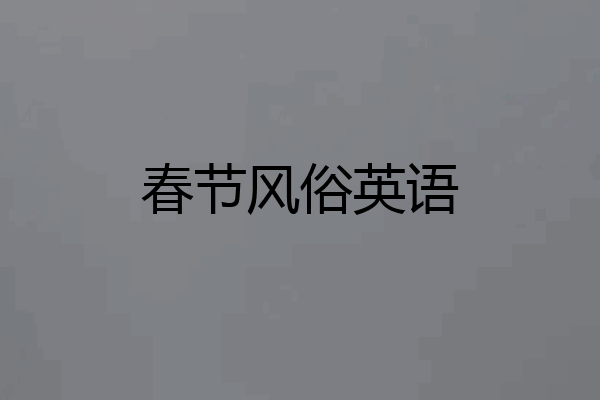
佳佳13817062298
写作思路:以介绍春节的来源作为开头,之后介绍春节的习俗,和各地之间不同的气氛特点,最后描述之所以会是重要节日的原因,正文:
The Spring Festival, the Lunar New Year, is the first year of the year and also the traditional "New Year's Day".
春节,即农历新年,是一年之岁首,亦为传统意义上的“年节”。
Spring Festival has a long history, which evolved from the first year of prayer in ancient times.
春节历史悠久,由上古时代岁首祈年祭祀演变而来。
During the Spring Festival, various activities are held throughout the country to celebrate the Spring Festival, with a lively and festive atmosphere.
在春节期间,全国各地均有举行各种庆贺新春活动,热闹喜庆的气氛洋溢。
There is a legend about the origin of the Spring Festival.
春节的来历有一种传说。
In ancient China, there was a monster called Nian, with long antennae and unusual ferocity.
中国古时候有一种叫“年”的怪兽,头长触角,凶猛异常。
Nian lived deep in the sea for many years.
“年”长年深居海底。
He did not climb ashore until New Year's Eve, devouring livestock and hurting people's lives.
每到除夕才爬上岸,吞食牲畜伤害人命。
Therefore, on New Year's Eve, people take the old and the young to escape to the mountains to avoid the harm of the Nian.
因此,每到除夕这天,村村寨寨的人们扶老携幼逃往深山,以躲避“年”兽的伤害。
Later on New Year's Eve, an old beggar from outside the village told people how to drive out the Nian.
后来有一年除夕,从村外来了个乞讨的老人,告知了人们驱赶“年”兽的办法。
Originally, Nian was most afraid of red, fire and explosion.
原来,“年”最怕红色、火光和炸响。
Since then, every New Year's Eve, families stick red couplets and set off firecrackers.
从此每年除夕,家家贴红对联、燃放爆竹。
Households have bright candles and wait for the new year.
户户烛火通明、守更待岁。
In the early morning of the Eleventh day, we have to go to relatives and friends to say hello.
初一一大早,还要走亲串友道喜问好。
This custom has become the most solemn traditional festival among Chinese people.
这风俗越传越广,成了中国民间最隆重的传统节日。


王小金Fighting
关于春节的习俗(英文):过年 Guo-nian; have the Spring Festival对联 poetic couplet: two successive rhyming lines in poetry春联 Spring Festival couplets剪纸 paper-cuts年画 New Year paintings买年货 special purchases for the Spring Festival do Spring Festival shopping 敬酒 propose a toast灯笼 lantern: a portable light烟花 fireworks爆竹 firecrackers (People scare off evil spirits and ghosts with the loud pop.)红包 red packets (cash wrapped up in red paper, symbolize fortune and wealth in the coming year.)舞狮 lion dance (The lion is believed to be able to dispel evil and bring good luck.)舞龙 dragon dance (to expect good weather and good harvests) 戏曲 traditional opera杂耍 variety show; vaudeville灯谜 riddles written on lanterns灯会 exhibit of lanterns守岁 staying-up拜年 pay New Year's call; give New Year's greetings; New Year's visit禁忌 taboo去晦气 get rid of the ill- fortune祭祖宗 offer sacrifices to one's ancestors压岁钱 gift money; money given to children as a lunar New Year gift

BOBO薄荷
一、贴春联 —— Post new year's scrolls
每逢春节,无论城市还是农村,家家户户都要挑漂亮的红春联贴于门上,辞旧迎新,增加喜庆的节日气氛。春联的另一来源是春贴,古人在立春日多贴“宜春”二字,后渐渐发展为春联,表达了中国劳动人民一种辟邪除灾、迎祥纳福的美好愿望。这一习俗起于宋代,在明代开始盛行。
二、吃饺子 —— Eat dumplings
春节的第一顿饭都是吃饺子。煮饺子时,要鸣放鞭炮。为驱邪恶、求吉利,有的地区烧火煮饺子要用芝麻秸,意味着新的一年像芝麻开花节节高,日子越过越好。饺子要煮得多,必须有余,意在有余头。就餐时,除每人一碗外,还要多盛一两碗,意在希望人丁兴旺。
三、守岁迎新年 —— watch in the New Year
守岁是中国民间在除夕的习俗,又称照虚耗、熬年、熬夜。指在除夕夜一家人团聚,熬夜迎接农历新年的到来。除夕守岁是最重要的年俗活动之一,守岁之俗由来已久。
四、放鞭炮 —— touch off the firecracker
放爆竹是中国传统民俗,已有两千多年历史,相传是为了驱赶一种叫年的怪兽。当午夜交正子时,新年钟声敲响,整个中华大地上空,爆竹声震响天宇。在这“岁之元、月之元、时之元”的“三元”时刻,有的地方还在庭院里垒“旺火”,以示旺气通天,兴隆繁盛。
五、拜年 —— pay a New Year's call
拜年是中国民间的传统习俗,是人们辞旧迎新、相互表达美好祝愿的一种方式。古时“拜年”一词原有的含义是为长者拜贺新年,包括向长者叩头施礼、祝贺新年如意、问候生活安好等内容。

雪莉小姐的
Spring Festival
读法:
[sprɪŋ ˈfestɪvl]
解释:
春节(中国农历正月初一)
用法:
The Spring Festival 春节 ; 农历正月初一春节 ; 过年 ; 英语作文
spring festival overture 春节序曲
do Spring Festival shopping 买年货 ; 买年菜 ; 办年货 ; 形容新年
近义词:
Chinese New Year
解释:
n. 春节
用法:
Chinese New Year bonus 年终花红 ; 年奖
The Chinese New Year 中国新年 ; 中国农历新年 ; 中国新 ; 中国新一年
happy chinese new year 春节快乐 ; 新年快乐 ; 中国新年快乐 ; 欢乐春节
优质英语培训问答知识库